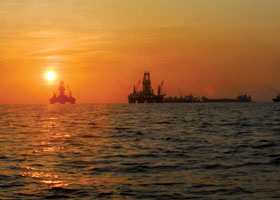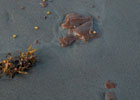Lessons Not Learned

An array of shortcomings and missteps led to the Deepwater disaster in the Gulf of Mexico which happened one year ago this past April. They include lax regulation, inadequate cement, blowout preventer failure and a poorly coordinated response. So says the final report of The National Commission on the BP Deepwater Horizon Oil Spill, released on January 11. Not only BP, but the other companies involved with drilling and maintaining the well—Halliburton Co. and Transocean Ltd.—were found negligent, leading the report to characterize the problems as “systemic.” Such an accident, it seems, was waiting to happen.
Jackie Savitz, a senior scientist for the ocean advocacy group Oceana, called the commission’s report “a scathing analysis” that details numerous preventable mistakes. BP and other companies, she notes, “failed the negative pressure test but kept going. They didn’t have enough centralizers, they tested cement that failed, but they went ahead.” Furthermore, argues Richard Charter, the senior policy advisor for Defenders of Wildlife’s marine programs, “the mistakes made were compounded both before and after, indicating a culture of carelessness.”
 And the results are still being felt. Between April 22 when the offshore Deepwater Horizon oil rig exploded, sank and began gushing oil, and the following July when the well was capped, more than 4.5 million barrels of oil spewed into the Gulf. In February 2011, Salon reported that scientist Samantha Joye of the University of Georgia found sea floors in the Gulf that were still coated with oil from the spill—and oil-choked sea creatures including dead crabs, tube worms and brittle stars littered the ocean floor.
And the results are still being felt. Between April 22 when the offshore Deepwater Horizon oil rig exploded, sank and began gushing oil, and the following July when the well was capped, more than 4.5 million barrels of oil spewed into the Gulf. In February 2011, Salon reported that scientist Samantha Joye of the University of Georgia found sea floors in the Gulf that were still coated with oil from the spill—and oil-choked sea creatures including dead crabs, tube worms and brittle stars littered the ocean floor.
To minimize the risk of future catastrophic spills, the commission recommended increased government oversight, promoting a culture of safety within the industry, better practices for well integrity and tests for blowout preventers, and increased liability from today’s extremely low $75 million limit. Explains Oil Spill Commissioner Donald Boesch: “These recommendations are a blueprint for vastly improved safety. Our investigation was extremely comprehensive. . . we provided a detailed account of the various mistakes or bad decisions both on the Deepwater Horizon and onshore.” Charter agrees, noting that the key points are to increase redundant systems, to develop better clean-up capacity including better skimmers and to account for the toxicity of dispersants.
 But Savitz calls the recommendations “tepid” in light of the devastating impact of oil spills. “I felt like the commission was empowered to come up with bolder recommendations,” she says. “We need more out-of-the-box thinking.” She points out that deep-sea drilling accounts for only 8% of the oil we use and believes that a permanent moratorium is the answer. Oceana’s “Vision 2020” plan outlines ways to lower our crude oil use 26% by 2020 by moving some oil uses, such as heating, to electricity; encouraging electric cars; increasing use of biofuels, particularly algal and switch grass; and improving energy efficiency.
But Savitz calls the recommendations “tepid” in light of the devastating impact of oil spills. “I felt like the commission was empowered to come up with bolder recommendations,” she says. “We need more out-of-the-box thinking.” She points out that deep-sea drilling accounts for only 8% of the oil we use and believes that a permanent moratorium is the answer. Oceana’s “Vision 2020” plan outlines ways to lower our crude oil use 26% by 2020 by moving some oil uses, such as heating, to electricity; encouraging electric cars; increasing use of biofuels, particularly algal and switch grass; and improving energy efficiency.
But offshore drilling will almost certainly continue despite serious deficiencies. Charter warns that accident response has not kept pace with conditions in the increasingly difficult drilling environments. “This entire technology has outstripped its response capability,” he says. “It’s archaic compared to the space-age technology for finding and extracting oil.” Currently, the situation is at a standoff; Although the moratorium has been lifted, permits for new wells are not being granted. Yet incessant demand for oil, together with industry pressure, make it likely that drilling will continue. Indeed, as oil prices surged in February and March, the interior department granted the first new deepwater permit since the disaster and announced the likelihood of more to come.
Arguing for the permits, Carlton Carroll of the American Petroleum Institute says: “API and the industry have already taken numerous, concrete actions since the accident to identify and implement additional safeguards.” For “the first time,” he adds, “it has committed to develop the capacity to contain a deepwater blowout.”
But Charter worries about where deepwater drilling might head next—particularly Bristol Bay, Alaska, and the Arctic Ocean, where a similar spill could bring even more horrific consequences. Oil that makes its way beneath the sea ice would be virtually impossible to clean up. While U.S. regulators are currently withholding permits for such drilling, there’s increased pressure for it to move forward as the Gulf tragedy recedes in our collective consciousness.
CONTACTS: Defenders of Wildlife; The National Commission on the BP Deepwater Horizon Oil Spill; OceanaVision 2020; RestoretheGulf.gov.

